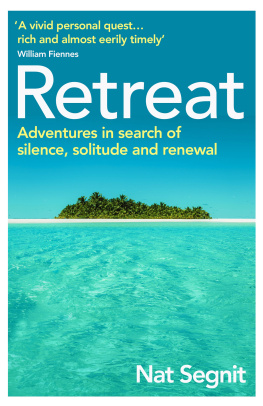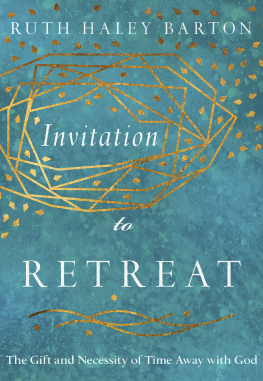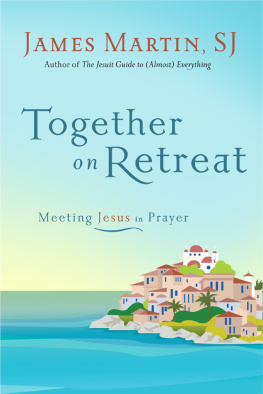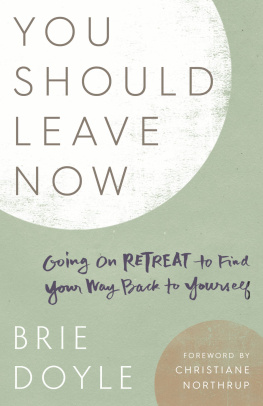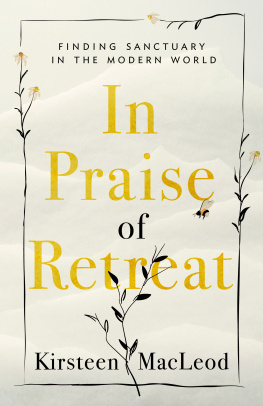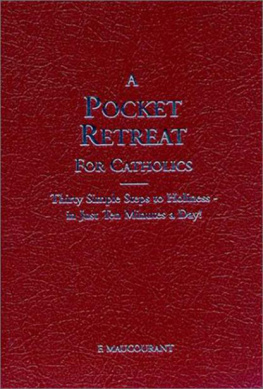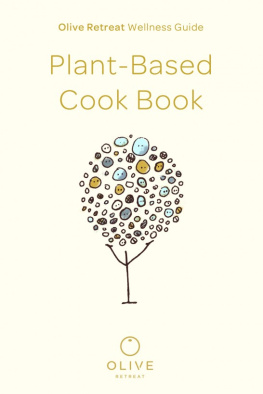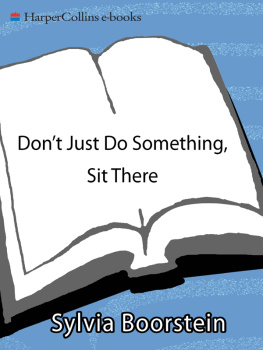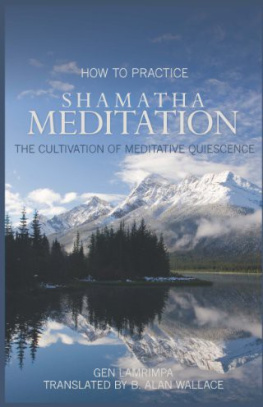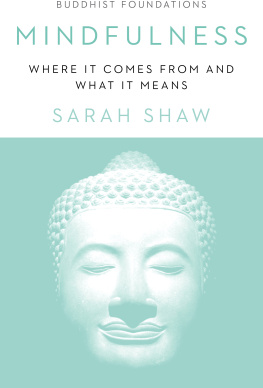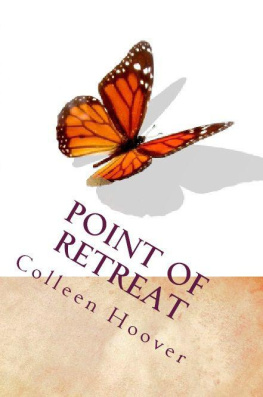

Nat Segnit
RETREAT
The Risks and Rewards of Stepping Back from the World

Contents
About the Author
Nat Segnits investigations into the human impulse to withdraw took him to India, Greece, the US and the Arctic Circle, until unforeseen circumstances forced his own retreat, along with the rest of humanity. He has written for the New Yorker, Harpers, 1843 magazine and the TLS, and regularly writes and broadcasts for BBC Radio 4. Retreat is his second book.
To Niki, Edie and Raff
Sometimes you hear, fifth-hand,
As epitaph:
He chucked up everything
And just cleared off,
And always the voice will sound
Certain you approve
This audacious, purifying,
Elemental move.
Philip Larkin, Poetry of Departures
1.
Who, Me? or Sister Nectarias Stillness
I was sitting on the floor with my legs loosely crossed and my hands resting on my knees. My spine was straight, my chin slightly tucked in so I could feel a pleasant stretching sensation at the back of my neck. My gaze was trained on a point four or five feet in front of my nose. I breathed in, lips pursed as if sucking through a straw, paused, then loosened my lips and breathed out, drawing in the muscles behind my belly button. One. Then repeat, two, three, counting at the end of each out-breath, noticing the thoughts that drifted like floaters across the vitreous humour of my consciousness, before letting them go, returning my attention to my breath in time for the next count, four, before, inevitably, a floater-thought snagged and I lost track of what number I was on. Back to the start: meditation as snakes and ladders.
I wondered if it was especially bad, especially unmindful, that the thoughts Id been instructed to note and let pass were not really that random, but rather concerned what I was looking forward to doing when this session was over chiefly, not having to note and let go of my thoughts. It was late August on the south coast of Devon. The sessions took place in a light, airy room near the waterfront, with exposed, whitewashed walls and a mandala-print wall hanging pinned loosely to the ceiling so it billowed in the breeze from the open windows. The sliver of sky I could see above the rooftops was a yearning, cloudless blue. The Indian flute track playing on the hi-fi in the corner was so relaxing that it was hard to object to its blandness: music from the worlds mellowest elevator. Smoke rose from an incense burner like the ghost of a hypnotised cobra. In between sessions retreatants were free to mingle as they pleased, although the atmosphere of quiet reflection tended to discourage this. For the most part retreat meant retreat: a cordial but firm withdrawal into ones own ambit. Over lunch, I got talking to the one fellow retreatant who seemed less protective of her privacy who had flipped the implied Do Not Disturb sign the others had hung around their necks. Carla was originally from Louisville, Kentucky, with a peroxide crop and a laugh like the first few attempts at starting an outboard motor. What brought her here, I asked?
Carla thought for a bit. The chance to take a step back. Its like, youre stressed at work, at home, whatever, you are the stress. A couple of days here, and the stress doesnt exactly go. You can just look at it from the outside, see how small it is.
I cant help feeling its a bit selfish, though, I said. I mean, Ive gone on holiday, havent I? Without my family. Actually, its worse than that. Ive gone on a holiday dressed up as self-improvement.
Carla laughed. I guess.
Im selfish and sanctimonious.
But wouldnt you be a worse dad if you didnt give yourself a break now and then?
We dads, I thought to myself, were generally pretty good at giving ourselves breaks. Still, I took Carlas point. The idea, it seemed, was to withdraw from the world, for a limited period, in order to return better able to deal with its trials. To inhabit it better. After lunch we returned to the mandala-print room for a body-scan meditation, lying on the floor with our feet slightly apart and a cushion under our heads. Our teacher that afternoon was Yvonne, a woman in her late thirties with a deep tan, a dancers lithe economy of movement and an air of vaguely vegan congeniality that repeatedly took me back to my childhood, on the fringes of the hippie-ish self-sufficiency movement in Wales, when I was meant to be focusing my attention on my body. Yvonnes voice was pitched to the music: soft, rhythmic, soothing.
Notice the sensations in your body as you breathe. Notice the feeling in your chest, your back, your legs, your feet. Dont worry if your mind wanders. This is not a competition. Simply notice that it has wandered, and bring your attention back to your body.
I brought my mind back to my feet, and the weird hot-and-cold, tingling sensation Id had in them since a back operation the previous year. And that was it: I was away again. Mindfulness might not be a competition, but if I couldnt focus for more than five seconds, I was surely losing at something. My mind was off on a meander through the streets of its own subjectivity, taking me via my tingly feet and my surgeons unnerving habit of looking grave before delivering good news to the fact that Id promised my wife, before leaving for Devon, that the main thing I was going on retreat to address was my tendency to worry too much, about my health especially. My tendency to ruminate, to catastrophise, to fail to live in the moment: to let my mind wander off in precisely the way it was doing right now, lying on the floor in a Devon yoga studio.
The idea of withdrawing from everyday life for a period of reflection, meditation or prayer has been fundamental to human existence since at least the Bronze Age. By the time of the Buddha, who lived in ancient India in the fifth to fourth century BC , the three-month Vassa or rains retreat was already long established, by holy men following traditions dating back up to a thousand years into the Vedic period. One of these traditions was to avoid travelling during the monsoon season, both because it was difficult and for fear of treading on animals that came out in wet weather. To retreat offered the twin benefits of intensified meditative practice and not squashing frogs. From Jesus forty days in the wilderness, and the retirement, two and a half centuries later, of the earliest ascetics to the Egyptian desert, retreat has been central to the Christian experience. To renounce the world was to take a step closer to heaven. In the modern era, traditional religious retreat the silence and solitude offered by monasticism, for instance has lost ground to new forms, some purportedly spiritual, adapting Eastern mysticism to Western sensibilities, others shorn of the spiritual element in favour of the short-termist, goal-oriented priorities of wellness tourism. There could scarcely be more difference between the Benedictine Abbey of Solesmes and a high-vibrational raw-food retreat in New Mexico. And yet both promise something comparable breathing space, a more or less temporary respite from the hectic, asphyxiating press of modern existence, alone or among like minds. Retreat is, and always has been, humanitys pressure valve.
Next page
